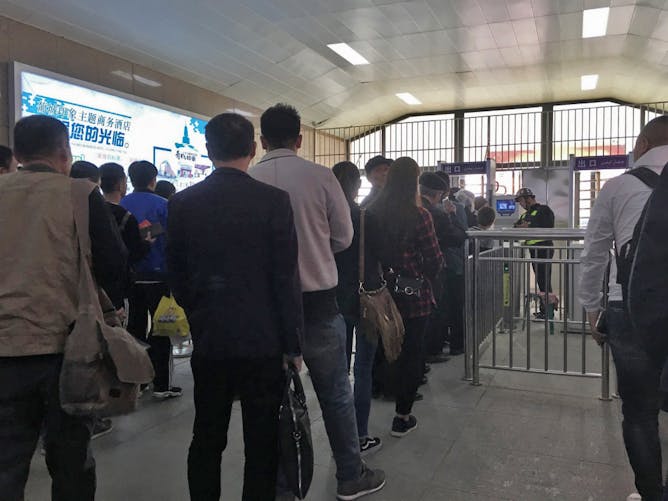
Uighurs wait in line at a face scan checkpoint in Turpan, Xinjiang, in northwest China on April 11, 2018.
Darren Byler
Darren Byler, University of Washington
An anthropologist who interviewed Uighurs in China found different ways in which Chinese authorities used checkpoints, social media and smartphones to identify, categorize and control this group.
|
Politics + Society
|
-
Dov Waxman, Northeastern University
The winner of Tuesday's Israeli election must form a government and tackle four problems that will shape the future of the country and the relations among its citizens and Palestinian non-citizens.
-
Liberty Vittert, Washington University in St Louis
With the rise of internet groups for conspiracy theorists, it may feel like Americans live in a unique time. But conspiracy theories have been common for decades.
-
Garret Martin, American University School of International Service
Political chaos is growing in the UK as the government tries to manage the country's exit from the European Union. What does the EU do that so angered UK voters that they voted to leave?
|
|
Environment + Energy
|
-
Nandini Ramesh, University of California, Berkeley; James Rising, London School of Economics and Political Science; Kimberly Oremus, University of Delaware
Fish can't read maps, and their eggs and larvae drift across national boundaries. Recent research shows that local problems in one fishery can affect others across wide areas.
|
|
|
|
|
|
|
|
Most read on site
|
-
Matt Bertone, North Carolina State University
This Speed Read makes the case why you should be nice to spiders you encounter in your home and consider a live-and-let-live policy.
-
Christye Sisson, Rochester Institute of Technology
A key element of the battle between truth and propaganda has nothing to do with technology. It has to do with how people are much more likely to accept something if it confirms their beliefs.
-
Risa Robinson, Rochester Institute of Technology
Vaping is under heavy scrutiny in the wake of six deaths and hundreds of illnesses. A product engineer who studies how people puff explains why the way users vape could be a clue.
|
|
Today’s chart |
-
  |
Liberty Vittert
Washington University in St Louis
|
| |